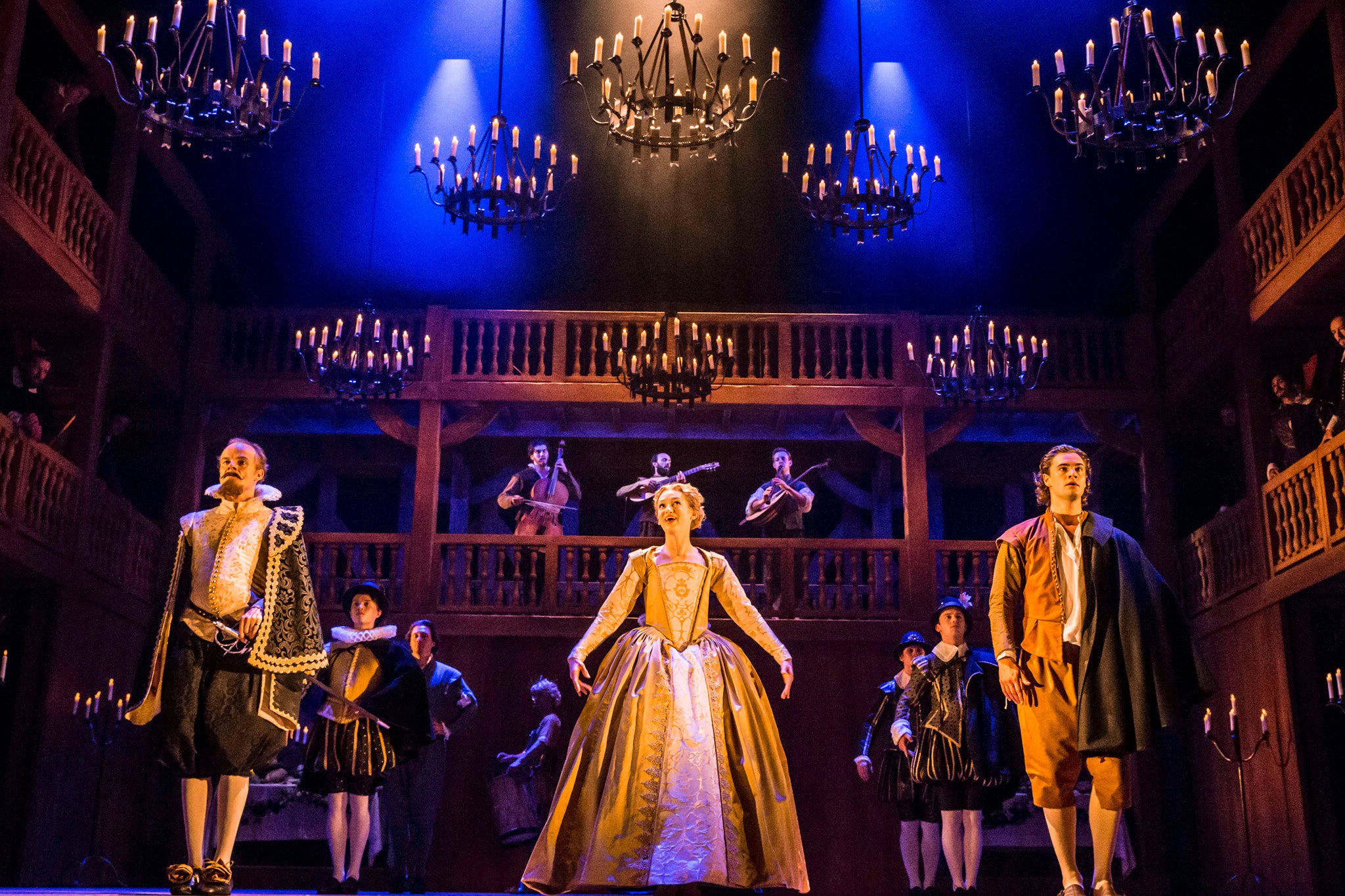Shakespeare in Love, Noel Coward Theatre, review: Deliciously funny and absurd
Moments of sheer stage poetry are mixed with effervescent fun

Your support helps us to tell the story
From reproductive rights to climate change to Big Tech, The Independent is on the ground when the story is developing. Whether it's investigating the financials of Elon Musk's pro-Trump PAC or producing our latest documentary, 'The A Word', which shines a light on the American women fighting for reproductive rights, we know how important it is to parse out the facts from the messaging.
At such a critical moment in US history, we need reporters on the ground. Your donation allows us to keep sending journalists to speak to both sides of the story.
The Independent is trusted by Americans across the entire political spectrum. And unlike many other quality news outlets, we choose not to lock Americans out of our reporting and analysis with paywalls. We believe quality journalism should be available to everyone, paid for by those who can afford it.
Your support makes all the difference.“Comedy, love – and a bit with a dog. That's what they want,” declares Thomas Henslowe, the debt-ridden theatre manager in Shakespeare in Love. We'll come to the love in a moment. But first things first. Not since the chihuahua in the musical of Legally Blonde has there been a more captivating canine cameo in the West End than that now being turned in by the Labradoodle “Spot” (“Out, damned spot! out, I say!”) in this joyous stage adaptation of the Oscar-laden 1997 movie.
Spot is used sparingly and starts off, truth to tell, as a bit of a dope. But Lee Hall's very canny overhaul of the celebrated Tom Stoppard/Marc Norman script gives Spot the chance to turn up trumps at a crucial juncture (Lassie, eat your heart out) and it's deliciously funny and absurd and affecting and entirely of a piece with the irresistible spirit of this show.
Screen to stage transfers are so frequent and mostly catchpenny and cynical that the prospect of yet another tends to fill a critic's heart with dread. But here there's the elating sense that the material – with its rivalry between two public playhouses echoing the feud between the Montagues and Capulets – is revelling in it natural element in the theatre.
And the smartest move made by the producers was to hire director Declan Donnellan and designer Nick Ormerod, the world-renowned Cheek By Jowl team whose profound understanding of Shakespearean drama (its dazzling fluidity; its blithe refusal to respect the “rules” of genre; its mood-mingling suppleness) enriches a production that is filled with moments of sheer stage poetry as well as good-natured, effervescent fun.
The action unfolds on a set that resembles a wooden three-tier Shakespearean playhouse. The middle section is mobile allowing for magical kinaesthetic gliding between backstage and onstage. The proceedings begin and end with the enormous, superbly characterful 28-strong cast clustered and craning round the young Bard and his contrary quill.

Throughout there's a zestful rejoicing in the non-literal nature of theatre and the collective story-telling powers of a company. The performers double as observers of the show (from the balconies or right up close) and there are adorable little touches such as when the newly cognisant Shakespeare removes Viola's false moustache in her boudoir, he calmly hands the bogus whiskers to the actor playing Marlowe who happens to be one of the bystanders. The ridiculousness of this gesture doesn't undercut the romance but delectably reinforces it.
There's sizzling chemistry between Tom Bateman (a more dashing and impetuously open-hearted Shakespeare than the sneakier Joseph Fiennes) and Lucy Briggs-Owen who is feistier and more forthright than Gwyneth Paltrow as Viola de Lesseps, the noblewoman whose passion to act out Shakespeare's verse in a theatre culture that excludes women drives her into male drag and a gig as Romeo.
The poignancy of their star-crossed love is intensified here by the strategy of freeze-framing while they enter into a deeper dimension and by Paddy Cunneen's ravishing quasi-authentic settings of Shakespearean songs and sonnets with period instruments (lutes and recorders) and a harmonising quartet dominated by the melancholy beauty of a questing counter-tenor.
Lee (Billy Elliot) Hall's adaptation sticks to the story and about 90% of the original dialogue with the cheeky anachronisms that drolly suggest that it was ever thus with showbiz. But he's invented some seriously witty twists of his own.
He's beefed up Shakespeare's relationship with his friendly rival Marlowe (enchantingly mild and kindly David Oakes) who is seen here, a la Cyrano de Bergerac, feeding him from the shadows with the improvised lines of one of the Bard's own forthcoming sonnets in the balcony scene with Viola.
And the backstage re-angling, the impassioned presentation of the death scene Romeo and Juliet, and the haunting intimations of Twelfth Night, sharpened by the suggestion that the censorious Master of the Revels is a forerunner of Malvolio, are all masterly. It makes you feel grateful to be alive.
Did I mention the bit with the dog?
To 25 October; 0844 482 5141
Join our commenting forum
Join thought-provoking conversations, follow other Independent readers and see their replies
Comments